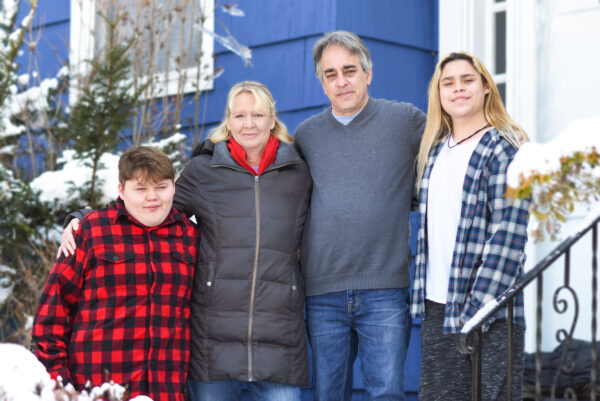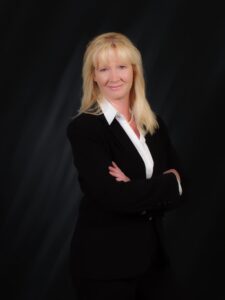A Pandemic Year’s Impact on Wendy Craft and Evan Echenthal

It stands to reason that many lessons have been learned over the last year as the COVID-19 pandemic has wreaked havoc on society. For Chappaqua resident and finance icon Wendy Craft, she learned the true value and satisfaction in saying no.
For Craft and her husband, litigation attorney Evan Echenthal, their lives, like so many, were upended last March when the coronavirus halted travel, shuttered businesses, schools, and regular everyday life, and forced them to adjust to a unique routine comprised of Zoom calls, eLearning, remote work, and a continual sense of stress.
The couple quickly learned the typical 9-to-5 workday would become extinct and early morning phone calls on the weekends and late-night texts or emails during the week with requests to do menial tasks would become something to get used to working from home.
“It’s endless. There’s no guilt free day off anymore,” said Craft, who was relishing a meteoric award-winning career as the Chief of Staff for Fulcrum Equities. “You’ve lost all sense of boundaries because your home has become your work.”
But in balancing her home life, her twin 12-year-old sons, her work and stressors stemming from the pandemic, Craft over time became more aware of her mental health. As a working professional, being both a woman and a mom, she said she has always felt pressure to go beyond her abilities to say yes to everything.
Craft, who heads a single-family office in New York City that invests in real estate and operating companies around the world, is a member of several prominent committees, organizations, and bar associations, including the U.S. Supreme Court. She also travels the nation and globe speaking on family office topics and their synergies.
Due to her dedication and passion, Craft has been honored with two Congressional Awards for being a leader in her field. Additionally, she has twice been named in the top 50 most influential women in private wealth by Private Asset Management Magazine.

The Power of ‘No’
But with the pandemic bringing both men and women into the same shared experience, Craft has enjoyed the liberation of saying no and refusing to alter her schedule to satisfy a never-ending workday.
“I would always take on so much because I felt bad about saying no, but now I’ve gotten to the point where I can say that I’ve gotten to my capacity and I have nothing more to share,” she said. “A year ago, I would have rearranged my whole schedule to appease my job but I’m no longer available 24/7, and the funny thing is, I didn’t have to be, but I felt like I had to say I was.” Craft added, “I just say no. It’s empowering.”
Before anyone could truly comprehend the long-term impacts of COVID-19, the idea of a two-week staycation seemed ideal to most. For Craft, she referred to it as a gift.
Craft would often spend up to five days a month traveling the nation and globe attending conferences and speaking at events. She’s done this for the last 20 years.
But on March 8, 2020 that all changed. “I came home and that was it; that was the first time I haven’t traveled in 20 years.” Craft said.
While the strain of the pandemic helped her realize work isn’t life, her job is part of her identity. She described losing the ability to go to the office every morning, have a normal workday and travel monthly as a difficult adjustment.
“It was great being home for the first six to eight months because I traveled all over the world so extensively and to be home it was almost like a gift,” Craft said. “And then it became really monotonous not to have my ‘adulting’ time at work, which was always part of my identity.”
Eventually Craft’s structured life started to unravel, as she strived to find the right balance between work, remote learning, and daily home chores. She was also faced with monitoring her children’s mental health as they navigated this new life, where seeing friends and going to school was no longer an option.
However, despite the already busy schedule, she quickly realized that while the laundry would get done and the school day would eventually end, the workday began to shift. With her job expecting her to be available at all hours of the day, she felt any remaining sense of normalcy vanishing.
But with 2021 showing signs of hope, Craft said she sees new glimmers of the old structure. With her husband, and her sons having returned to in-person work and school, respectively, she plans a return to the office soon, too, “to normalize my mental health and those boundaries,” Craft said. “And I need that so it’s not Groundhog Day every single day.”
When Worlds Collide: Managing Expectations
As Craft was struggling with her identity and juggling her responsibilities, Echenthal, had similar worries in his work and family life.
While his office and the courts had been shut down, he was still required to meet the same billable hours as previous years. This constant pressure to find work where there was none resulted in his days devoted to being dad and his nights dedicated to working.
“It’s been very trying since courts are closed and employers aren’t very sympathetic with the lack of work,” he said. “Before I’d go to bed at 11 p.m., but you don’t do that now, so now you fire up the laptop to meet the expectations and just work harder.”
Echenthal said the first half of the pandemic felt like everything was colliding at once and the inability to compartmentalize everyday duties became more and more difficult. He said one moment he could be working and the next he was folding laundry or explaining to his kids why they can’t see their friends.
And the work-related emails and phone calls never ceased. “When you’re at home, nobody seems to have a problem calling you at 9 p.m. to ask for something. And why am I getting emails 24 hours a day?” he said. “The expectation from the employers, the courts and your adversary haven’t changed. They expect more because you live at your office now.”
While Echenthal has returned to work recently, he said the stress and expectations are still the same. Only now he’s taking on a new venture; running for a seat on the Mount Pleasant Town Board, an endeavor he described as an opportunity to contribute to his community and expand his social bubble. “I’m starting to see outside of myself and consider my neighbors and my community,” Echenthal said. “I’m getting out of my own space and seeing that everyone is in the same situation and everything is different and there’s got to be a way we can come together to figure everything out.”
Echenthal describes a personal shift this year, too. A major homebody pre-pandemic, he said he now takes time out of his day to call his friends and catch up, something he rarely did prior to the pandemic. He has also shared with his sons the pure joy of a White Castle slider, as trips across counties have become a weekly activity. “After being forced to stay home, I’m constantly on the phone with my friends gabbing and I realize I like going out,” Echenthal said. “You don’t realize what you have until you don’t have it anymore.”
Gratitude for Family Time
Despite the stress and hardship the pandemic has brought on Craft and Echenthal, both are grateful to have gotten to spend quality time together as a family. Craft added she has been fortunate to find an identity outside of her occupation. I know I will look back years from now and think how great it was that we got that time as a family together,” Craft said.
